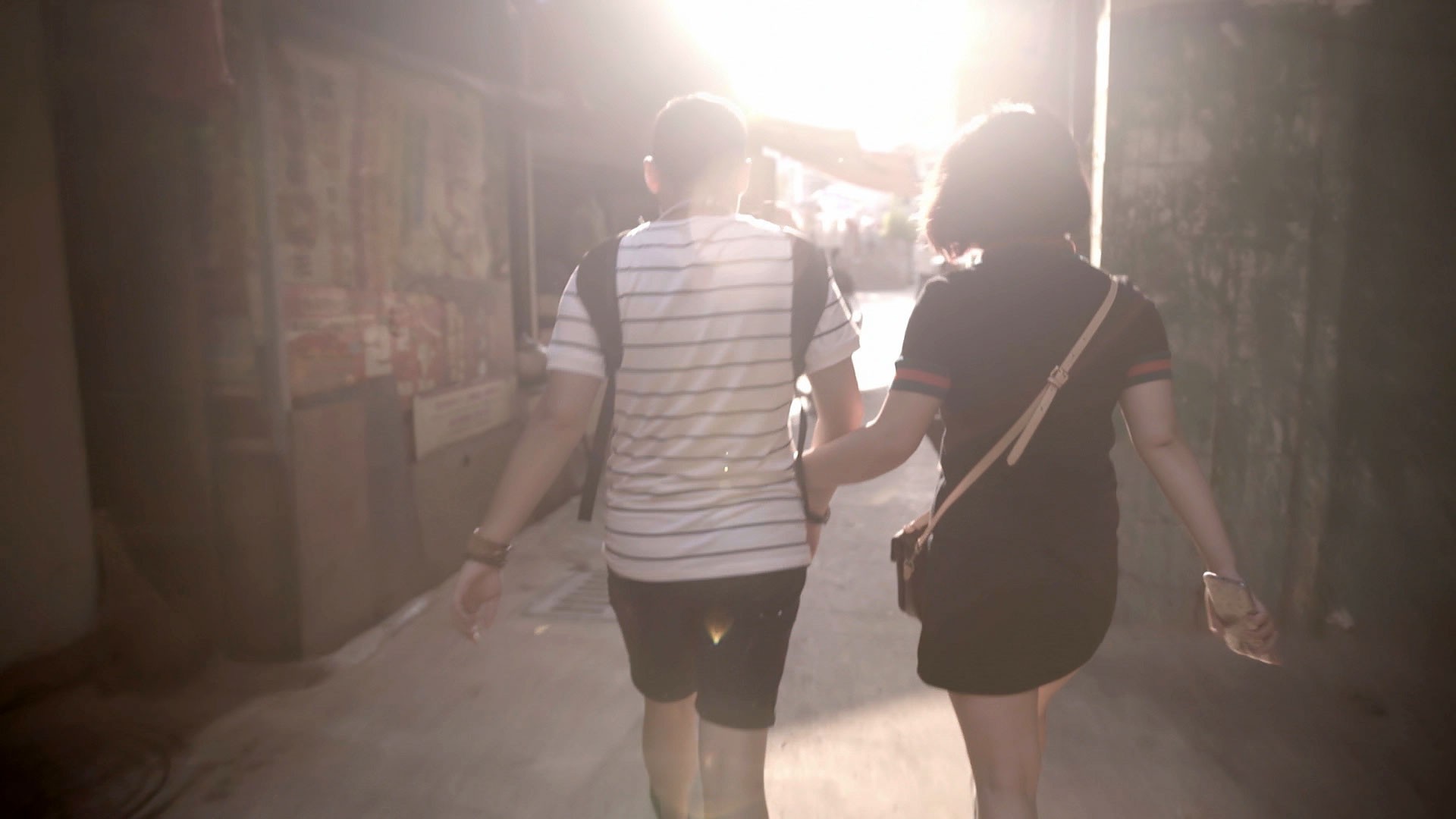David Mullins (L) and Charlie Craig stand outside the Supreme Court in December. Photo by Chip Somodevilla/Getty Images
One afternoon in July 2012, Charlie Craig and David Mullins visited Masterpiece Bakeshop, a small bakery in Lakewood, Colorado, in the hopes of procuring a cake for their wedding reception. The owner of the shop, Jack Phillips, told the couple he would gladly sell them cookies or brownies, but that his policy was to not create same-sex wedding cakes. The short exchange left the couple feeling “publicly humiliated for who we were,” they said. The baker, meanwhile, insisted that he should not be compelled to create a cake for an event that violates his religious faith.The resulting legal conflict, which was argued at the Supreme Court earlier this month, has pitted the rights of gay Americans against the rights of those with strongly-held religious beliefs. It is not a simple case: the baker is being represented by the Alliance Defending Freedom (ADF), a Christian legal organization that frequently fights for religious freedom measures at the state and local level. A pillar of their argument is that Phillips’ wedding cakes are a form of artistic expression, and therefore protected as free speech. “If a state law targeted the expressive aspects of wedding cakes, it would trigger the First Amendment,” Phillips’ complaint reads. (It should be noted that the couple only had time for general inquiries about wedding cakes and did not request a decorative, pink-iced ode to anal sex.) Lawyers representing Craig and Mullins view the baker as hiding behind the First Amendment to justify his discrimination.But while columnists have agonized over the intricacies of the plaintiffs’ arguments, the debate isn’t so complicated in the eyes of the public. According to a survey by Indiana University Bloomington sociologists published last week—the first national public opinion survey on whether businesses like Phillips’ should be allowed to turn away same-sex couples—Americans don’t see his refusal through a prism of highfalutin ideas about freedom of speech or religious freedom. Instead, they mostly frame it as a libertarian fight for individuals’ rights. And viewed this way, many believe the baker has the right to discriminate against whomever he chooses.The poll substituted the baker for another creative profession: a wedding photographer. When asked whether a photographer should be able to turn down wedding portraits for a same-sex couple, 53 percent of respondents believed they should be allowed to do so; when the gay couple was replaced by an interracial one, 39 percent still endorsed refusal of service. Even respondents who said they were pro-gay marriage or pro-interracial marriage believed the photographer had the right to deny service. As you might expect, support for refusal of service was higher among religious respondents, but what surprised researchers was the consistency of respondents’ belief in what a libertarian would call the “individual liberties” of the business owner.This defense, like many right-wing talking points, discounts the individual’s right to equal services under the law. Instead, it frames individualism as the right to refuse service to anyone.“Those who believe the photographer could deny service said they did not agree with what he was doing—they thought it was repugnant and unacceptable,” said Indiana University sociology professor Brian Powell, who helmed the study alongside several colleagues. “Some even used profanity to describe the photographer, who they described as ‘not a true Christian.’ Nonetheless, they believed the photographer had a right to deny service.”In many ways, the results of the survey mirror a debate that’s raged since America’s birth: the tug of war between individualism and collectivism in our society. America has always been a strongly individualist country, and self-reliance has always figured strongly into our national myth. From that point of view, Phillips’ case might strike a deeper chord than arguments that rest on religious freedom or free speech. “It was telling that some people responded, ’This is a private business and therefore it can deny service,’ while others said, ‘No, this is a public business,”” Powell said. “People are not talking about artistic license, freedom of expression, or the First Amendment. They’re talking about this libertarian notion of individual rights that’s a core part of the American identity.”
Watch VICE explore how China's trans community is raising awareness and combating discrimination:
There were nuances, to be sure. 61 percent of respondents endorsed the right of refusal by a self-employed photographer, while just 31 percent endorsed refusal by a corporation. Powell also said he was surprised that, despite overwhelming support for interracial marriage (90 percent, according to his poll), so many respondents supported a wedding photographer’s right to refuse service to interracial couples. (While gay marriage is freshly legal, anti-miscegenation laws were overturned back in 1967.)But most surprising of all was that, for whatever reason, most respondents didn’t wrestle with any of the big ideas this Supreme Court decision hinges on. They did not paint the baker as a David squaring off against a gay goliath (as Andrew Sullivan torturously argued). They did not argue, as the ADF has in the past, that gay citizens are no longer deserving of legislative protections because of the influence and political power they’ve accrued. Respondents didn’t even distinguish between a photographer who would refuse service for religious or nonreligious reasons .Instead, there was staunch support for the “rights” of business owners and, according to the respondents’ written answers, a faith that the market would make discriminatory practices unprofitable. As Powell notes, this argument is flawed: faith-based businesses have, in the past, received funds from religious organizations after claiming persecution. “I’m not sure there’s much evidence for this idea that discriminatory practices are unprofitable and that, in a capitalist economy, discrimination is going to lose out,” he said.Whether the public agrees with the premise or not, however, the Supreme Court’s decision will likely come down to whether a cake is a form of speech. And if the court extends First Amendment protections to goods and services, observers think it could have wide-reaching ramifications.“There’s a real slippery slope when it comes to artistic expression,” said Powell. “I grew up on a farm and if you google ‘the art of farming,’ you’re going to find plenty of results. You could argue there’s an art to decorative plumbing, an art to restaurant-owning, an art to teaching. If they’re going to say that all of this is artistry, we’re going to be in a very challenging position.”Follow Steven Blum on Twitter.
Advertisement
Advertisement
Advertisement
Watch VICE explore how China's trans community is raising awareness and combating discrimination:

There were nuances, to be sure. 61 percent of respondents endorsed the right of refusal by a self-employed photographer, while just 31 percent endorsed refusal by a corporation. Powell also said he was surprised that, despite overwhelming support for interracial marriage (90 percent, according to his poll), so many respondents supported a wedding photographer’s right to refuse service to interracial couples. (While gay marriage is freshly legal, anti-miscegenation laws were overturned back in 1967.)But most surprising of all was that, for whatever reason, most respondents didn’t wrestle with any of the big ideas this Supreme Court decision hinges on. They did not paint the baker as a David squaring off against a gay goliath (as Andrew Sullivan torturously argued). They did not argue, as the ADF has in the past, that gay citizens are no longer deserving of legislative protections because of the influence and political power they’ve accrued. Respondents didn’t even distinguish between a photographer who would refuse service for religious or nonreligious reasons .Instead, there was staunch support for the “rights” of business owners and, according to the respondents’ written answers, a faith that the market would make discriminatory practices unprofitable. As Powell notes, this argument is flawed: faith-based businesses have, in the past, received funds from religious organizations after claiming persecution. “I’m not sure there’s much evidence for this idea that discriminatory practices are unprofitable and that, in a capitalist economy, discrimination is going to lose out,” he said.Whether the public agrees with the premise or not, however, the Supreme Court’s decision will likely come down to whether a cake is a form of speech. And if the court extends First Amendment protections to goods and services, observers think it could have wide-reaching ramifications.“There’s a real slippery slope when it comes to artistic expression,” said Powell. “I grew up on a farm and if you google ‘the art of farming,’ you’re going to find plenty of results. You could argue there’s an art to decorative plumbing, an art to restaurant-owning, an art to teaching. If they’re going to say that all of this is artistry, we’re going to be in a very challenging position.”Follow Steven Blum on Twitter.
